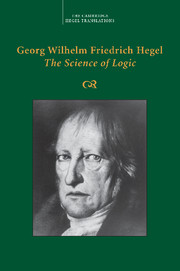Chapter 1 - Being
Published online by Cambridge University Press: 30 September 2021
Summary
BEING
Being, pure being – without further determination. In its indeterminate immediacy it is equal only to itself and also not unequal with respect to another; it has no difference within it, nor any outwardly. If any determi- nation or content were posited in it as distinct, or if it were posited by this determination or content as distinct from an other, it would thereby fail to hold fast to its purity. It is pure indeterminateness and emptiness. – There is nothing to be intuited in it, if one can speak here of intuiting; or, it is only this pure empty intuiting itself. Just as little is anything to be thought in it, or, it is equally only this empty thinking. Being, the indeterminate immediate is in fact nothing, and neither more nor less than nothing.
NOTHING
Nothing, pure nothingness; it is simple equality with itself, complete emptiness, complete absence of determination and content; lack of all distinction within. – In so far as mention can be made here of intuiting and thinking, it makes a difference whether something or nothing is being intuited or thought. To intuit or to think nothing has therefore a meaning; the two are distinguished and so nothing is (concretely exists) in our intuiting or thinking; or rather it is the empty intuiting and thinking itself, like pure being. – Nothing is therefore the same determination or rather absence of determination, and thus altogether the same as what pure being is.
BECOMING
Unity of being and nothing
Pure being and pure nothing are therefore the same. The truth is neither being nor nothing, but rather that being has passed over into nothing and nothing into being – “has passed over,” not passes over. But the truth is just as much that they are not without distinction; it is rather that they are not the same, that they are absolutely distinct yet equally unseparated and inseparable, and that each immediately vanishes in its opposite. Their truth is therefore this movement of the immediate vanishing of the one into the other: becoming, a movement in which the two are distinguished, but by a distinction which has just as immediately dissolved itself.
- Type
- Chapter
- Information
- Georg Wilhelm Friedrich Hegel: The Science of Logic , pp. 59 - 82Publisher: Cambridge University PressPrint publication year: 2010

